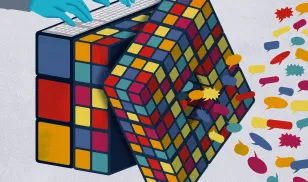


China
China’s authoritarian regime has become increasingly repressive in recent years. The ruling Chinese Communist Party (CCP) continues to tighten control over all aspects of life and governance, including the state bureaucracy, the media, online speech, religious practice, universities, businesses, and civil society associations.
Research & Recommendations
China
| PR Political Rights | -2 40 |
| CL Civil Liberties | 11 60 |
Overview
China is ruled by a repressive regime. The Chinese Communist Party (CCP) maintains tight control over all aspects of life and governance, including the state bureaucracy, the media, online speech, religious practice, universities, businesses, and civil society. CCP General Secretary Xi Jinping has consolidated personal power to a degree not seen in China for decades. Following a multiyear crackdown on political dissent, independent nongovernmental organizations (NGOs), and human rights defenders, China’s civil society has been largely decimated.
In countries where democratic forces have come to power after periods of antidemocratic rule, the new governments should pursue an agenda that protects and expands freedoms even as it delivers tangible economic and social benefits to citizens.
These countries must act swiftly to release all political prisoners, build or revitalize democratic institutions, reform police and other security forces, organize and hold competitive multiparty elections, and ensure accountability for past human rights violations.
In countries where there has been significant erosion of political rights and civil liberties, policymakers, legislators, jurists, civic activists, and donor communities should work to strengthen institutional guardrails and norms that serve to constrain elected leaders with antidemocratic or illiberal aims.
China
| A Obstacles to Access | 7 25 |
| B Limits on Content | 2 35 |
| C Violations of User Rights | 0 40 |
Political Overview
China is ruled by a repressive regime. The Chinese Communist Party (CCP) maintains tight control over the state bureaucracy, the media, online speech, religious practice, universities, businesses, and civil society. CCP General Secretary Xi Jinping has consolidated personal power to a degree not seen in China for decades. Following a multiyear crackdown on political dissent, independent nongovernmental organizations (NGOs), and human rights defenders, China’s independent civil society has been largely decimated.
Freedom of expression online has been and is increasingly under attack as governments shut off internet connectivity, block social media platforms, and restrict access to websites that host political, social, and religious speech. Protecting freedom of expression will require strong legal and regulatory safeguards for digital communications.
Governments should encourage a whole-of-society approach to fostering a high-quality, diverse, and trustworthy information space. The Global Declaration on Information Integrity Online identifies best practices for safeguarding the information ecosystem, to which governments should adhere.
Comprehensive data-protection regulations and industry policies on data protection are essential for upholding privacy and combating disproportionate government surveillance, but they require careful crafting to ensure that they do not contribute to internet fragmentation—the siloing of the global internet into nation-based segments—and cannot be used by governments to undermine privacy and other fundamental freedoms.

The China Dissent Monitor features interactive research on collective action in public spaces and cases of online dissent, filling a critical information gap in a country with severe media restrictions and risks associated with exposing dissent.
Sign up to receive the China Dissent Monitor
The China Dissent Monitor features quarterly updated interactive data on collective action in public spaces and cases of online dissent.

The China Media Bulletin is a monthly email newsletter that provides unique insight on censorship, disinformation, media freedom, and internet freedom issues related to the People's Republic of China.
Sign up to receive the China Media Bulletin
The China Media Bulletin is a monthly email newsletter that provides unique insight on censorship, disinformation, media freedom, and internet freedom issues related to the People's Republic of China, drawing on both English and Chinese-language sources.

China conducts the most sophisticated, global, and comprehensive campaign of transnational repression in the world. Efforts by the Chinese Communist Party (CCP) to pressure and control the overseas population of Chinese and members of minority communities are marked by three distinctive characteristics. Due to China’s growing power internationally, its technical capacity, and its aggressive claims regarding Chinese citizens and noncitizens overseas, its campaign has a significant effect on the rights and freedoms of overseas Chinese and minority communities in exile in dozens of countries.
Like-minded governments and international organizations should work together to highlight the threat of transnational repression and establish international norms for addressing it.
This includes agreeing on a common definition of transnational repression, and prohibiting the use of Interpol notices on their own to deny immigration or asylum benefits or conduct arrests.
Among other tactics, governments should deploy a robust strategy for targeted sanctions against perpetrators of transnational repression.
News and Updates
Featured
Freedom House Perspectives
News Releases & Media Coverage
Country Facts
Basic Facts
Internet Facts
Election Facts
Transnational Repression

Religious Freedom in China
Falun Gong practitioners across China are subject to widespread surveillance, arbitrary detention, imprisonment, and torture, and they are at a high risk of extrajudicial execution. Freedom House independently verified 933 cases of Falun Gong adherents sentenced to prison terms of up to 12 years between January 1, 2013, and June 1, 2016, often for exercising their right to freedom of expression in addition to freedom of religion. This is only a portion of those sentenced, and thousands more are believed to be held at various prisons and extralegal detention centers.

Beijing's Global Media Influence
The Chinese government, under the leadership of President Xi Jinping, is accelerating a massive campaign to influence media outlets and news consumers around the world. While some aspects of this effort use the tools of traditional public diplomacy, many others are covert, coercive, and potentially corrupt. A growing number of countries have demonstrated considerable resistance in recent years, but Beijing’s tactics are simultaneously becoming more sophisticated, more aggressive, and harder to detect.





